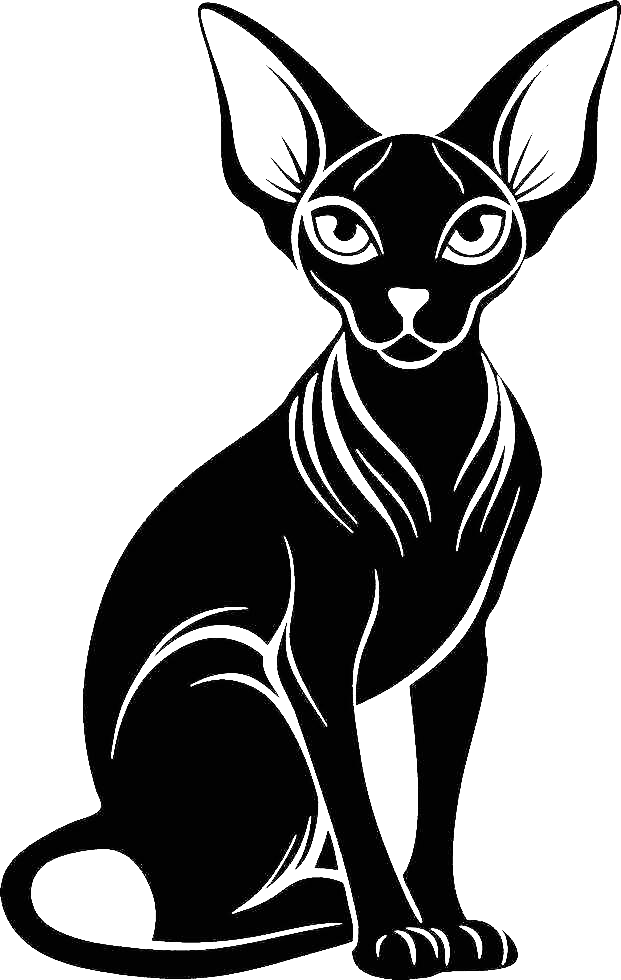Sphynx Kitten Health
🚨 Primary Health Concerns in Sphynx Kittens
Their hairlessness is the key to understanding their health profile.
1. Skin Health and Conditions
This is the most significant area of care.
Sunburn and Temperature Sensitivity: They have no fur to protect them from the sun or insulate them. They can get sunburned easily and are prone to hypothermia. They will seek out warm spots (computer monitors, sunny windows, under blankets).
Skin Oils (Sebum): Unlike furry cats that have their oils distributed along the hair shafts, Sphynx oils accumulate directly on the skin. This leads to a greasy feel.
Consequence: This oil buildup can clog pores, leading to acne (often on the chin or tail). If not managed, it can cause skin infections.
Required Care: Regular bathing is non-negotiable. Typically, a weekly bath with a gentle, kitten-safe shampoo is needed to remove oil and dirt.
Fungal and Bacterial Infections: The oily skin can create an environment where yeast (like Malassezia) and bacteria can overgrow, leading to infections that cause redness, itchiness, and a bad odor.
Skin Injuries: Without a protective fur coat, their skin is more susceptible to scratches, abrasions, and cuts during normal play.
2. Heart Disease: Hypertrophic Cardiomyopathy (HCM)
This is a serious concern in the breed. HCM is a genetic condition where the heart muscle thickens, making it harder for the heart to pump blood.
Prevalence: Sphynx cats have a higher predisposition to HCM than many other breeds.
Screening: Responsible breeders will have their breeding cats screened annually by a veterinary cardiologist using an echocardiogram (ultrasound of the heart). You should ask a breeder for proof of these clearances for the kitten’s parents.
Action: Even with clear parents, it’s advised to have your Sphynx kitten screened for HCM regularly throughout its life (e.g., annually starting at age 1-2).
3. Hereditary Myopathy (Spasticity)
This is a rare but breed-specific condition, sometimes called “the Devon Rex curl-up” due to the common ancestry.
What it is: A hereditary muscle disorder that causes muscle weakness and spasms, especially in the neck.
Symptoms: A kitten may have a strange, stiff gait, trouble swallowing, and may collapse after a period of activity. It generally presents itself by weaning age.
Reputable Breeders: A good breeder will be aware of this condition and will not breed from affected lines.
4. Gastrointestinal Issues
Sphynx cats are known for having sensitive stomachs and can be prone to diarrhea or irritable bowel disease (IBD).
Cause: The exact reason isn’t always clear, but it may be linked to their fast metabolism (needed to stay warm).
Management: A consistent, high-quality diet is crucial. Sudden changes in food should be avoided.
✅ Essential Preventative Care for a Sphynx Kitten
Proactive care is the key to a long, healthy life.
| Care Aspect | Why It’s Crucial & How-To |
|---|---|
| Weekly Bathing | Prevents oil buildup and infections. Use a gentle, hypoallergenic pet shampoo. Clean ears and nails at bath time. |
| Ear Cleaning | They produce a lot of ear wax. Clean ears weekly with a vet-recommended ear cleaner to prevent mites and infections. |
| Dental Care | Prone to periodontal disease. Daily teeth brushing is ideal. Regular dental check-ups are a must. |
| Diet & Weight | High metabolism. They need more calories than furry cats to maintain body heat. Feed a high-quality diet, but monitor weight to prevent obesity. |
| Temperature Control | Keep your home warm. Provide soft blankets, sweaters, and safe heating pads. Never leave them outdoors unsupervised. |
| Sun Protection | Apply pet-safe sunscreen if they will be in direct sunlight for any period. Better yet, keep them in the shade. |
| Vaccinations & Parasite Control | Just as important as for any cat. Follow your veterinarian’s recommended schedule. |
💡 The Most Important Factor: A Responsible Breeder
The single biggest influence on your Sphynx kitten’s health will be the breeder you choose.
A reputable breeder will:
Provide health clearances for both parent cats, specifically for HCM (via echocardiogram) and Hypertrophic Cardiomyopathy.
Be transparent about any known health issues in their breeding lines.
Raise kittens in a clean, home environment to ensure proper socialization and reduce disease risk.
Have a contract that includes a health guarantee.
Be a resource for you throughout the cat’s life.
Avoid breeders who: cannot provide health clearances, have multiple litters available at once.
